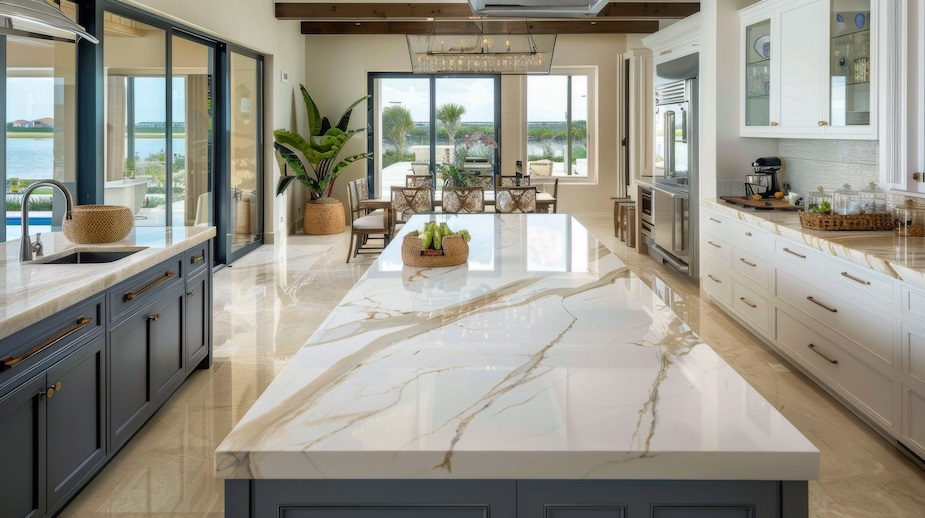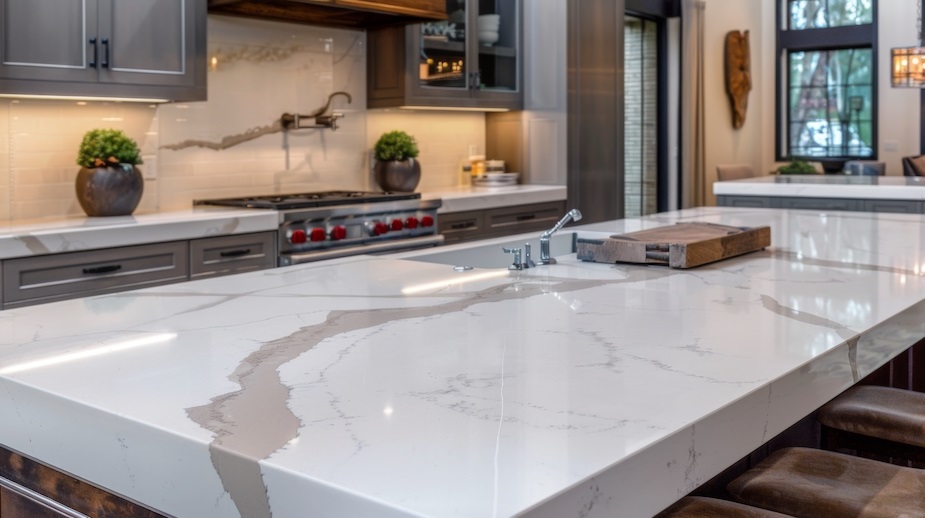
Engineered Marble vs Cultured Marble Countertops: Which is Best for Your Home?
Engineered marble countertops are a popular choice for homeowners seeking the luxurious look of natural marble with enhanced durability.
Made by combining natural marble fragments with resins and pigments, engineered marble offers the aesthetic appeal of real stone while being more resistant to stains, scratches, and cracks. This man-made material is ideal for high-traffic areas like kitchens and bathrooms due to its low maintenance and wide range of design options. Whether you're looking for a sleek, modern finish or a timeless classic, engineered marble provides a versatile and durable solution for your home.
Today, we'll explore everything you need to know about these materials to help you make an informed choice.
Table of Contents:
- What Are Engineered Marble Countertops?
- What Are Cultured Marble Countertops?
- Key Differences Between Engineered Marble and Cultured Marble
- Pros and Cons of Engineered Marble Countertops
- Pros and Cons of Cultured Marble Countertops
- Installation Process of Engineered Marble vs Cultured Marble Countertops
- Maintenance and Care Tips
- Cost Comparison: Engineered Marble vs Cultured Marble Countertops
- Popular Brands and Options
- Environmental Impact and Sustainability
- Frequently Asked Questions (FAQs)
- Final Thoughts
What Are Engineered Marble Countertops?
Engineered marble countertops are a man-made alternative to natural stone.
They are composed of a blend of natural marble fragments, resins, and pigments, creating a durable and attractive surface.
Composition and Manufacturing Process
Engineered marble typically contains about 90% natural marble and 10% polymer resins and pigments. The manufacturing process involves:
- Crushing Natural Marble: Marble fragments are crushed into smaller pieces.
- Mixing with Resins: The marble pieces are combined with resins and pigments to bind them together and add color.
- Molding: The mixture is poured into molds and compressed under high pressure to form slabs.
- Curing: The slabs are cured to harden the resin and create a solid surface.
- Polishing: The cured slabs are polished to a high gloss finish.
Common Uses in Home Design
Engineered marble is highly versatile and can be used in various applications, including:
- Kitchen Countertops: Provides a stylish and durable surface for meal prep and dining.
- Bathroom Vanities: Adds a touch of elegance to bathrooms while resisting moisture.
- Flooring and Wall Cladding: Offers a luxurious look for both residential and commercial spaces.
What Are Cultured Marble Countertops?
Cultured marble countertops are another engineered product that mimics the appearance of natural marble.
They are made by blending marble dust with polyester resins and pigments.
Composition and Manufacturing Process
Cultured marble typically consists of:
- Marble Dust: The primary component, which gives the material its marble-like appearance.
- Polyester Resins: Used to bind the marble dust and create a solid surface.
- Pigments: Added to achieve various colors and patterns.
The manufacturing process includes:
- Mixing: Marble dust is mixed with resins and pigments.
- Molding: The mixture is poured into molds to create various shapes and sizes.
- Curing: The molds are cured to harden the resin and form a solid product.
- Gel Coating: A clear gel coat is applied to the surface for added shine and protection.
Common Uses in Home Design
Cultured marble is frequently used in:
- Bathroom Vanities: A popular choice for its affordability and seamless design.
- Shower Surrounds: Provides a waterproof and easy-to-clean surface.
- Bathtub Surrounds: Enhances the aesthetic appeal of bathtubs with its marble-like appearance.
Key Differences Between Engineered Marble and Cultured Marble
While both engineered marble and cultured marble aim to replicate the look of natural marble, there are several key differences between the two materials.
Material and Composition
- Engineered Marble: Primarily composed of natural marble fragments and resin.
- Cultured Marble: Made from marble dust mixed with polyester resins.
Appearance and Texture
- Engineered Marble: This has a more natural look and feel due to the higher content of natural marble.
- Cultured Marble: Often appears more uniform and less natural, but can be customized with various patterns and colors.
Durability and Maintenance
- Engineered Marble: More durable and resistant to scratches and stains. Requires minimal maintenance.
- Cultured Marble: Less durable and more prone to scratches and staining. Requires regular maintenance and care to keep it looking its best.
Pros and Cons of Engineered Marble Countertops
Pros of Engineered Marble
- Durability: Engineered marble is highly durable, making it ideal for high-traffic areas like kitchens.
- Aesthetic Variety: Available in a wide range of colors and patterns, providing more design options.
- Resistance to Stains and Scratches: The resin component makes it more resistant to common kitchen and bathroom mishaps.
Cons of Engineered Marble
- Cost: Generally more expensive than cultured marble due to its composition and manufacturing process.
- Lacks Natural Stone's Unique Look: While it closely mimics natural marble, it may not have the unique veining and patterns found in natural stone.
Pros and Cons of Cultured Marble Countertops
Pros of Cultured Marble
- Cost-Effective: More affordable than both natural marble and engineered marble.
- Customizable: Can be made in a variety of colors and patterns to suit specific design preferences.
- Seamless Installation: Often installed in one piece, reducing seams and joints where dirt and grime can accumulate.
Cons of Cultured Marble
- Less Durable: More susceptible to scratches, stains, and other forms of damage compared to engineered marble.
- Susceptible to UV Damage: Can yellow over time if exposed to direct sunlight.
- Regular Maintenance Needed: Requires regular cleaning and maintenance to maintain its appearance.
Installation Process of Engineered Marble vs Cultured Marble Countertops

Installation of Engineered Marble
Installing engineered marble countertops typically involves:
- Measuring and Templating: Accurate measurements and templates are made to ensure a perfect fit.
- Cutting and Polishing: The slabs are cut to size and polished to a high gloss.
- Seaming and Fitting: The slabs are carefully placed and seamed together to ensure a seamless look.
- Sealing: The surface is sealed to protect against stains and damage.
Installation of Cultured Marble
The installation process for cultured marble is somewhat similar but generally easier due to its lighter weight and customizable nature:
- Measuring and Molding: Measurements are taken and molds are created to fit the exact dimensions of the space.
- Cutting and Finishing: The cultured marble pieces are cut to size and finished with a gel coat for added protection.
- Fitting and Seaming: The pieces are fitted into place and seamed together to create a continuous surface.
Maintenance and Care Tips
Caring for Engineered Marble Countertops
- Cleaning: Use a mild soap and water solution for regular cleaning. Avoid harsh chemicals and abrasive cleaners.
- Preventive Measures: Use cutting boards and trivets to prevent scratches and heat damage.
- Sealing: Re-seal the surface periodically to maintain its resistance to stains and scratches.
Caring for Cultured Marble Countertops
- Cleaning: Clean with a non-abrasive cleaner and a soft cloth. Avoid using harsh chemicals that can damage the gel coat.
- Preventive Measures: Prevent scratches by using cutting boards and avoiding placing hot items directly on the surface.
- Maintenance: Regularly apply a coat of wax to maintain the shine and protect the surface.
Cost Comparison: Engineered Marble vs Cultured Marble Countertops
Initial Costs
- Engineered Marble: Typically ranges from $50 to $100 per square foot, including installation.
- Cultured Marble: More affordable, ranging from $30 to $70 per square foot, including installation.
Long-Term Value
- Engineered Marble: Offers better long-term value due to its durability and low maintenance requirements.
- Cultured Marble: While initially cheaper, may incur higher maintenance and replacement costs over time.
Factors Influencing Cost
- Size and Complexity: Larger and more complex installations will cost more.
- Design and Customization: Custom colors and patterns can increase the price.
- Installation Fees: Professional installation can add to the overall cost.
Popular Brands and Options
Top Brands for Engineered Marble Countertops
- Caesarstone: Known for its high-quality engineered marble products.
- Silestone: Offers a wide range of colors and patterns.
- Cambria: Renowned for its durable and aesthetically pleasing surfaces.
Top Brands for Cultured Marble Countertops
- Corian: A leader in the market with a variety of designs.
- Meganite: Offers affordable and customizable cultured marble options.
- Swanstone: Known for its durable and versatile products.
Environmental Impact and Sustainability
Eco-Friendliness of Engineered Marble
Engineered marble is considered more environmentally friendly than natural marble because it utilizes marble waste and reduces the need for quarrying.
However, the production process does involve synthetic resins, which have an environmental impact.
Eco-Friendliness of Cultured Marble
Cultured marble also uses waste marble dust, which helps reduce waste.
The use of polyester resins, however, does have environmental drawbacks. Both materials can be recycled, but disposal should be handled properly to minimize environmental impact.
Frequently Asked Questions (FAQs)
1) Can engineered marble be repaired if damaged?
Yes, minor scratches and chips can be repaired using resin-based repair kits.
2) Is cultured marble suitable for high-traffic areas?
Cultured marble is less durable than engineered marble and may not be ideal for high-traffic areas.
3) How does the longevity of engineered marble compare to cultured marble?
Engineered marble tends to last longer and requires less maintenance than cultured marble.
4) Are there any health concerns with either material?
Both materials are safe for home use, but it's important to ensure proper ventilation during installation to avoid inhaling fumes from the resins.
Final Thoughts
Choosing between engineered marble and cultured marble countertops depends on your specific needs, budget, and aesthetic preferences.
Engineered marble offers durability and a more natural appearance, while cultured marble provides a cost-effective and customizable option.
Consider the pros and cons of each material and how they align with your lifestyle and design goals.
For more inspiration and to see how these materials look in real homes, check out our gallery and custom home features.
Still unsure which countertop material is best for your home?
Contact Reeves Custom Homes for expert advice and personalized recommendations.
Our team can help you choose and install the perfect countertops to enhance your kitchen or bathroom's beauty and functionality.
Reach out to us today to get started on crafting your dream home!
